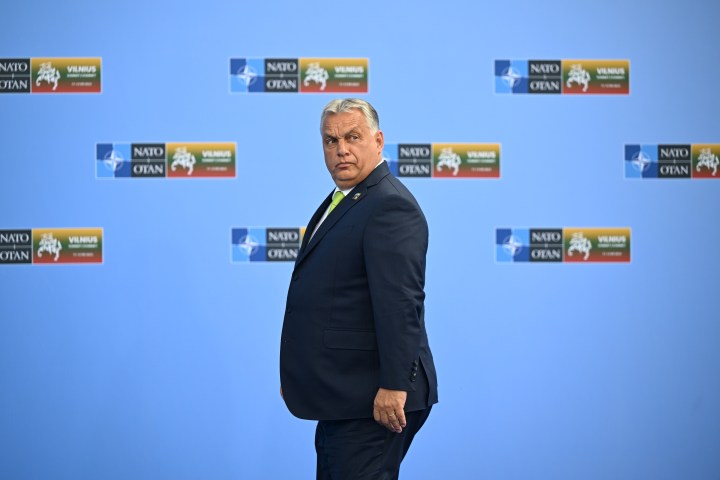Hungary and Ukraine
Orban says no to EU accession talks for Ukraine ahead of summit showdown

Hungarian Prime Minister Viktor Orban said on Thursday that Ukraine did not fulfil the criteria for to start accession talks with the EU, standing firmly against the view of other EU leaders as he arrived at a high-stakessummit.
Orban is blocking both the start of EU membership talks and 50 billion euros ($54 billion) in financial aid for Kyiv.
The summit comes at a crucial time in Ukraine’s war against Russia’s invasion after a counter-offensive failed to make major gains and with the Biden administration so far unable to get a $60 billion aid package for Kyiv through Congress.
“There is no reason to negotiate membership of Ukraine now,” Orban said as he arrived at the Brussels summit. “Pre-conditions were not met. We have to come back to it later on,” he said, pointing at European Parliament elections next June.
Officials and diplomats said they were braced for a tough series of summit meetings that could go late into Friday night or even into the weekend.
All of the EU’s 27 national leaders except Orban have backed the start of accession talks. But such a decision requires unanimity and the Hungarian, who cultivates close ties to Moscow, has previously insisted Ukraine is not ready for such a step.
If EU leaders manage to approve membership talks and the four-year financial package, Kyiv will be able to claim a geopolitical victory. Failure to agree would likely be greeted by Moscow as a sign of faltering Western support for Ukraine.
On the eve of the summit, Ukrainian President Volodymyr Zelenskiy said his country had carried out the necessary political reforms to get the go-ahead and urged the EU to honour its commitments.
“I count on EU leaders recognising Ukraine’s efforts and taking this historic step,” he said on social media. “Ukraine fulfilled its part and proved that it can achieve tremendous results despite unprecedented challenges.”
As a sign of intense diplomatic efforts on the matter, French President Emmanuel Macron and German Chancellor Olaf Scholz were set to meet with Orban ahead of the summit, alongside European Commission chief Ursula von der Leyen and Council chief Charles Michel.
Orban has cited corruption in Ukraine and other concerns in justifying his stance. But EU officials and diplomats suspect he is using the issue as a bargaining chip, hoping to obtain funds frozen by the EU over concerns about the rule of law in Hungary.
“We’re not in a Hungarian bazaar where we can exchange one thing for another,” Belgian Prime Minister Alexander De Croo said on Wednesday. “Ukraine is a country that wants to respect democratic values … Maybe a lesson for Orban himself.”
RESTORING HUNGARIAN ACCESS TO FUNDS
The European Commission, the EU executive body, on Wednesday restored Hungary’s access to up to 10.2 billion euros in refunds for economic projects after finding it had fulfilled conditions on the independence of its judiciary.
The Commission recommended last month that EU leaders agree to start accession talks with Ukraine. A second unanimous decision would still be needed – possibly in March – to agree on a negotiating framework.
Officials and diplomats said a compromise could involve a longer gap between the two decisions and language in the summit declaration on conditions to be fulfilled in the meantime.
Orban has also objected to a Commission proposal to give Ukraine 50 billion euros in grants and loans to keep the state running as part of a broader revision of the EU budget.
Such a revision also requires unanimity among EU governments, which would have to pay for it.
Officials say if Hungary sticks to its stance, the EU’s other members could set up financing outside the budget for Ukraine, but that would be more complex and expensive.
(Additional reporting by Krisztina Than, Bart H. Meijer, Charlotte Van Campenhout, Gabriela Baczynska, Julia Payne, Philip Blenkinsop and Ron Popeski; Writing by Andrew Gray and Ingrid Melander; Editing by Nick Macfie)















Comments - Please login in order to comment.